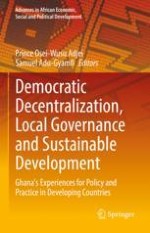2022 | OriginalPaper | Chapter
Changing Role of Traditional Authorities in Local Governance and Development in Ghana
Authors : Kwaku Abrefa Busia, Prince Osei-Wusu Adjei
Published in: Democratic Decentralization, Local Governance and Sustainable Development
Publisher: Springer International Publishing
Activate our intelligent search to find suitable subject content or patents.
Select sections of text to find matching patents with Artificial Intelligence. powered by
Select sections of text to find additional relevant content using AI-assisted search. powered by
